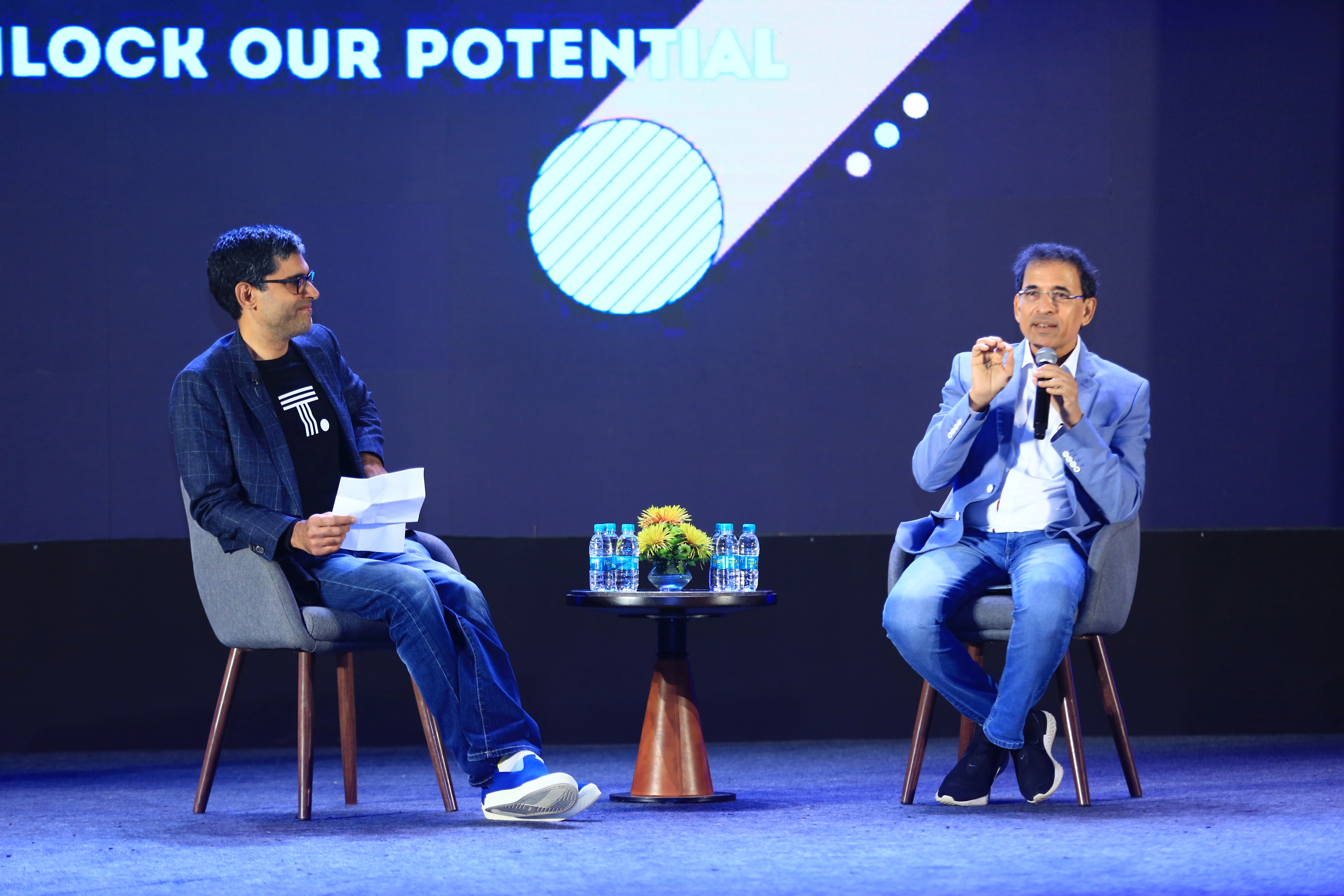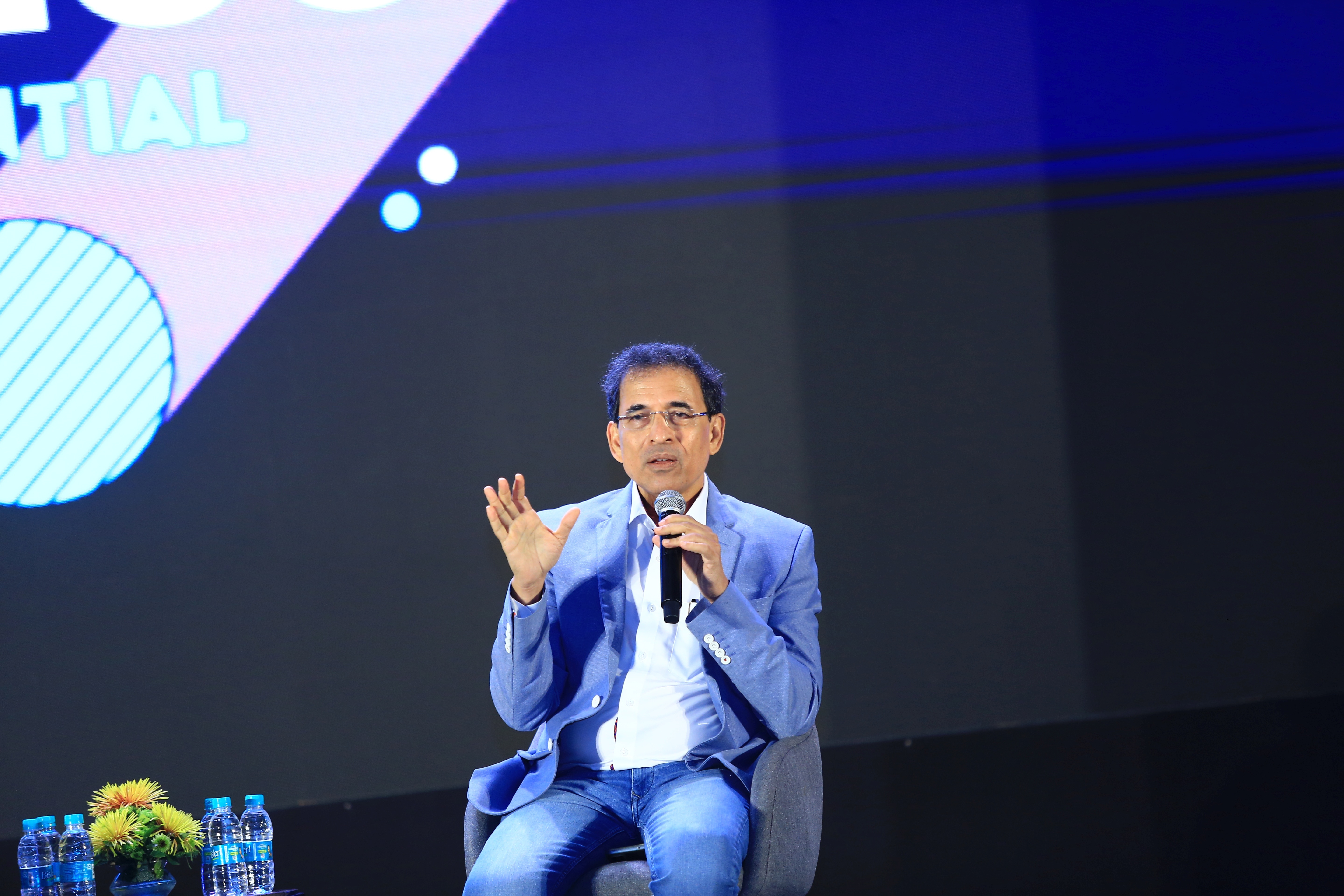In September 2022, during our first ever company kickoff in Bangalore, I had the pleasure of sitting down with the legendary Harsha Bhogle, one of the greatest athletes, commentators, and leaders I’ve been lucky enough to meet for a wide ranging conversation. We talked about cricket, of course, but covered so many different topics (watch highlights here).

Harsha’s career on and off the cricket pitch is nothing short of spectacular. Harsha knows what it takes to build high performance teams, drive innovation in how an organization operates, and successfully leverage data to beat the competition.
His approach, leadership learnings, and best practices from playing and commenting on cricket apply to every professional, regardless whether you’re competing on the pitch or in the market.
Here are some of my favorite moments:
Harsha, you’ve seen so many teams on the field. What really makes a great team?
I think it’s the ability to play for each other. If the leader can create a climate where everybody is playing for each other, where some people are doing the unfashionable stuff while others are focused on the goal, then you have a winning team at hand.
So, it really comes down to asking yourself, ‘Are you happy if you haven’t done well, but the team has won?’ Or ‘are you happy if you have performed exceptionally well, but the team has lost?’
It largely comes down to the fact that a great team is where everyone is genuinely happy for each other and works on building up each other for success.
Does it get harder to have a culture of playing for each other when you have a team full of stars?
I would imagine so. Sometimes, when teams have that one dominant figure, who doesn’t really carry the team along, it can pose a challenge. Two notable qualities are humility and mutual respect. Having champion performers show these and seek feedback is what helps build the team culture.
Off the field, everyone can have their differences, but on the field, it's important for team members to have that mutual respect for each other’s work and play together to win. And at the top of it all, is having really great leaders. In my experience, all the best teams have a leader who is able to create that environment for people to play for each other.
So, what you’re verbalizing is what we like to call Selfless Excellence at ThoughtSpot. These two words really describe our culture. And since we’re talking about great teams, could you shed some light on what leads to the decline or downfall of this culture?
One of the things that we talk about a lot in sports is that culling is as important as nurturing. You must keep bringing in newer, fresher talent to challenge established thought. Sometimes you have to fall behind to understand that you need to change. In companies where there are only echo chambers, i.e. where people want to hear nice things about each other and outside voices don’t penetrate, is where a team loses.
Adapting to and accepting change is also a key aspect in really building companies and teams that can succeed. If you’re creating a culture of conformists and not providing an opportunity for the mavericks to question things, teams can often fall behind or worse yet, collapse.
What can leaders do to help individuals in a team learn, grow and be successful personally, while also ensuring that the entire team wins?
In great teams, there is always room for individuals to flourish. One of the ways this is possible is that roles are very clearly defined. If an individual goal transcends the team goals, then the message that goes around is that the individual landmark is more important.
For instance, if you see the batting records in cricket, and see a team that holds all the batting records, but doesn’t hold team records, then the team is not much good. It shows that while the individuals are growing, the team is not. When an individual’s achievements are overly rewarded, that is when members of the team start to get a bit selfish. And when this happens, the team members start playing against each other rather than for each other. Instead, the focus should be on building a culture of collective pride.
Great teams also have a good mix of people who have patience with talent. They understand that good players don’t become bad overnight, or vice versa. One of the challenges that leaders face is understanding the whole person in the team - the person is not just a batsman, or a coder, but an individual with other aspects that make them whole. I would say sports is a lucky field, since you have to get to know smaller teams. It’s a whole different ball game when it comes to the corporate world, where teams get much larger.
One growing similarity between sports and business is the use of data. What are some of the things that you’re most excited about with data and technology in cricket?
The arrival of T20 cricket has changed what data can do in the sport because we now have more data points. In test cricket, because the conditions were so different in different parts of the world, and because they varied from day 1 to day 4, measuring and comparing had become very difficult. This in turn made it very hard to project and predict.
But with the T20 format of cricket, we have so many games with reasonably standardized playing conditions, meaning we now have a far bigger database. Here, every ball is measured on 25 or 30 parameters. This gives us so many data points when we compare even just 2 or 3 parameters.
So, today when a ball is bowled, you will be able to know the speed it is bowled at, the angle it has left the hand, the height from which the bowler has delivered it, but also the batsman strike rate when the ball comes to him at a certain pace and height. With all of this data, you are able to say what kind of ball you need to bowl to a particular batsman. This is the beauty of data, and it's slowly getting more predictive. We still don’t have enough data to build machine learning models, but we’re getting there. Data and predictive modeling is still at a very nascent stage in cricket, and the potential it has is huge.

For me personally, this is a very interesting space. Unlike the early days when the predictions of the commentator were taken as the gospel truth, today we have young folks sitting in different parts of the world with access to this data around cricket and challenging our predictions with the facts and numbers they have at hand. This is really what democratization of data and knowledge can do.
How are different cricket teams using this data to make changes?
I think team captains and leaders that have bought into the data culture have created more acceptance within their teammates as well. There are still, however, some instinct driven players who prefer not looking at the data or predictions at hand when they go out to play. They believe that this will influence their game if they are shown the match-ups ahead of time.
So, we have a mixed group of players—some who don’t want to know the data, and some who want to have all the information available to help them become a better player. An interesting point is that every team has a full data analyst team that travels with them. With the help of data blended with the right instincts, teams are able to arrive at the best conclusion. So, data doesn’t necessarily draw conclusions, it’s what you are able to with the data.
As an individual, how does one really balance the raw talent they have with hard work, particularly when they’ve had a certain amount of success?
Everyone needs that one person in their life who keeps reminding them that things can go wrong and they need to stop living in a bubble. I would say it’s important to surround yourself with someone who isn’t your fan. People often surround themselves with others who only tell them what they want to hear. This shouldn’t be the case. Even when it comes to leaders, the question we must ask: ‘Can you take a talent and take it to places it hasn’t been before?’That often comes down to the right work ethic.
We always say in sport that if you’re blessed with talent and nothing else, life has dealt you terrible cards. Because it’s your work ethic that determines where your talent takes you.
Your work ethic can either pull you up or drag you down. If you see the work ethic of all the greats in sports, it was extraordinary.
What advice do you have for people who are great engineers or individual contributors but unsure about being leaders in a company? How can they look at personal growth?
If you’re not doing this already, you should start to understand people. It is when you understand people that you will make the transition from someone who executes to someone who leads. As you go up the corporate ladder, it is your ability to understand people and carry people with you that will determine how far you’ll go.
A time will come when you will need to ask yourself: are you willing to nurture? Are you willing to share?
That will determine how high you—and your team—will go.
Want to learn from great leaders like Harsha Bhogle and Ajeet Singh? Join our team of amazing Spotters! Check out the open opportunities on our careers page today.















